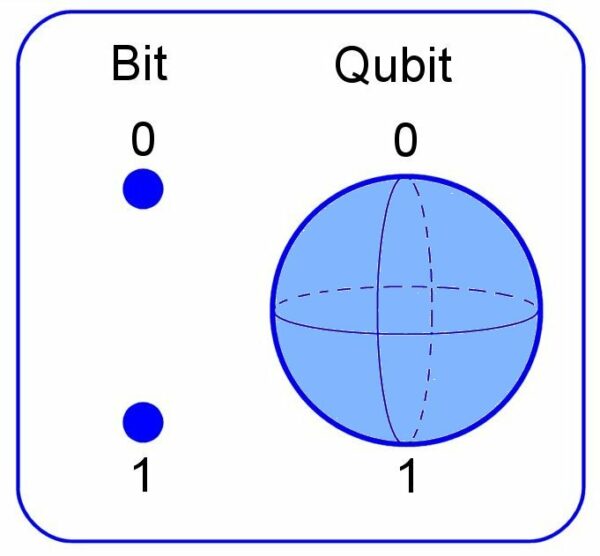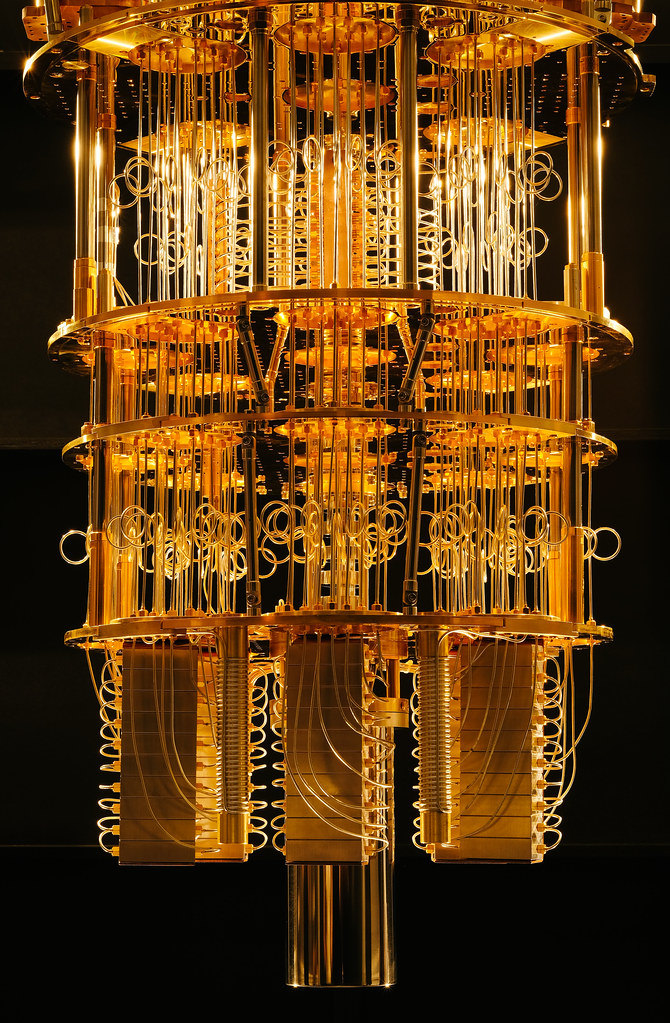What is Quantum Computing?
Quantum Computing is a technology that is based upon the principles of quantum mechanics to perform certain types of calculations much more efficiently than the popular classical computers. Quantum mechanics is the branch of physics that helps us understand how tiny things, like atoms and particles, work. It deals with the behaviour of particles at the quantum level and here, the classical laws of physics do not apply.
“In 2019, Google declared that they have achieved ‘quantum supremacy.’ It was a big achievement in the world of quantum computers. It means their quantum computer, known as ‘Sycamore,’ did a special task faster than the most powerful regular computers could. This shows that quantum computers have the potential to be much faster than classical computers for doing some jobs.

How do quantum computers work?
As we all know, our present-day classical computers use bits as the fundamental unit of information, which can represent either a 0 or a 1. All text, audio, video, and images are stored in a series of 0s and 1s. Quantum computers, on the other hand, use quantum bits or qubits, which can represent 0, 1, or both 0 and 1 simultaneously. The ability to represent 0 and 1 at the same time is known as superposition. This allows quantum computers to perform many calculations in parallel, making them potentially much more powerful for specific tasks like complex mathematical calculations and other researches.

In addition to superposition, another important property of qubits is entanglement. Entanglement says that the state of one qubit is dependent on the state of another qubit, even if they are physically separated.
Quantum Computers also work upon the principle of Quantum interference. It can be understood with an analogy that when you throw two pebbles into a pond, the ripples they create meet each other. Sometimes, these ripples add up and become bigger. It is called constructive interference. On the other hand, if they cancel each other out it is called destructive interference. In the quantum world, particles like electrons and photons also act like waves. When these waves come together, they can make things happen in strange ways.

IBM Quantum Computer
How AI is related to Quantum Computing?
Quantum computing and artificial intelligence (AI) are two cutting-edge technologies that have the potential to complement each other and advance the field of AI in several ways:
- Faster AI Training: Quantum computers have the potential to speed up the training of AI. Teaching deep learning systems, which are used in many AI tasks, takes a lot of time with classical computers. Quantum computers can solve certain problems faster, which means we can teach AI models much more quickly.
- Quantum-Powered Machine Learning: Quantum machine learning is a new area where we use quantum tools to make machine learning better. Quantum methods help in sorting data, grouping things, and predicting outcomes. This can help us find important information in large sets of data more easily.
- Solving Complex Problems: Quantum computers are really good at solving complex problems, especially those that involve finding the best solution from lots of choices. AI often deals with problems such as planning routes and allocating various resources. Quantum methods and algorithms can help AI do these tasks faster.
- Better Data Handling: Quantum computers can process and understand huge piles of data very effectively. They are good at handling information in different ways at the same time. This can be handy for AI jobs that require analyzing data, spotting patterns, and digging for information.
- Quantum-Safe AI: Quantum computers might be able to crack the codes that keep our data safe. But, they can also help us make AI systems that are secure from quantum attacks. We can use special methods to keep our private information safe from the power of quantum computers.
Also Read: The Potential of Intelligent Machines-Unlocking the Future in 2023
Challenges and risks with quantum computers
Quantum computers have big potential, but they also have some tough problems and risks:
- Challenging Technical Hurdles:
- Correcting Mistakes: Quantum bits (qubits) are quite sensitive and prone to errors. Finding ways to fix these errors is a big technical challenge.
- Scaling Up: Building large and powerful quantum computers is tough. It’s important to ensure they remain effective as they grow in size.
- Enhancing Qubit Quality: Improving the quality of qubits is crucial to making quantum computers more practical for real-world use.
- Limited Availability:
- Scarce Quantum Computers: Currently, there aren’t many quantum computers that work well. Quantum computing is still in its early stages of development.
- Security Concerns:
- Code-Breaking Capability: Quantum computers have the potential to crack the codes that protect our online data. We need to develop new security methods for the future.
- Revamping Encryption:
- Creating New Codes: Due to the threat of quantum computers, there’s a need to invent new ways to safeguard our online information.
- Ethical Use:
- Responsible Use: It’s essential to use quantum computers for positive purposes and avoid their misuse for harmful activities.
- Energy Usage:
- High Energy Demands: Quantum computers require extremely low temperatures to function, which can be energy-intensive. We must explore energy-efficient solutions.
- Workforce Changes:
- Impact on Employment: The rise of quantum computing might alter the types of jobs available and influence how the economy functions.
- Intellectual Property Disputes:
- Ownership Debates: There may be disagreements about who owns the concepts and technology related to quantum computing.
- Enhancing Security Measures:
- Adopting New Safeguards: As quantum computers become more common, we must adopt innovative security measures to protect against cyber threats.
- Realistic Expectations:
- Balancing Hype: Some may overstate the capabilities of quantum computers. It’s vital to maintain realistic expectations about what they can achieve.
Conclusion
It’s important to remember that quantum computers are still in the early stages of development and have many technical hurdles to overcome. Creating practical and scalable quantum computers is a complex job. As quantum technology progresses, we can expect to see more concrete ways it can help AI, potentially leading to big advances in various AI-driven fields.
Addressing the challenges and risks involved in quantum computing requires collaboration among various stakeholders, including scientists, leaders, and businesses. As we advance our knowledge of quantum technology, we should focus on harnessing its potential benefits while actively addressing the associated challenges.
I really enjoyed what you have accomplished here. The outline is elegant, your written content is stylish, yet you seem to have acquired a bit of apprehension over what you aim to convey next. Undoubtedly, I will revisit more frequently, just as I have been doing nearly all the time in case you sustain this upswing.
This website is an absolute gem! The content is incredibly well-researched, engaging, and valuable. I particularly enjoyed the [specific section] which provided unique insights I haven’t found elsewhere. Keep up the amazing work!
This website is an absolute gem! The content is incredibly well-researched, engaging, and valuable. I particularly enjoyed the [specific section] which provided unique insights I haven’t found elsewhere. Keep up the amazing work!
I was suggested this web site by my cousin Im not sure whether this post is written by him as no one else know such detailed about my trouble You are incredible Thanks
Real Estate You’re so awesome! I don’t believe I have read a single thing like that before. So great to find someone with some original thoughts on this topic. Really.. thank you for starting this up. This website is something that is needed on the internet, someone with a little originality!
Real Estate Pretty! This has been a really wonderful post. Many thanks for providing these details.
Simply desire to say your article is as surprising The clearness in your post is simply excellent and i could assume you are an expert on this subject Fine with your permission let me to grab your feed to keep up to date with forthcoming post Thanks a million and please carry on the gratifying work
I just could not leave your web site before suggesting that I really enjoyed the standard information a person supply to your visitors Is gonna be again steadily in order to check up on new posts
Thank you so much.
Strands Hint You’re so awesome! I don’t believe I have read a single thing like that before. So great to find someone with some original thoughts on this topic. Really.. thank you for starting this up. This website is something that is needed on the internet, someone with a little originality!
Blue Techker I just like the helpful information you provide in your articles
Hello! Do you know if they make any plugins to help with Search Engine Optimization? I’m trying to get
my website to rank for some targeted keywords but I’m not seeing very good success.
If you know of any please share. Thank you! I saw similar blog here: Warm blankets
Blue Techker I am truly thankful to the owner of this web site who has shared this fantastic piece of writing at at this place.
Thank you so much.
https://palitraltd.com.ua/
Thanks I have recently been looking for info about this subject for a while and yours is the greatest I have discovered so far However what in regards to the bottom line Are you certain in regards to the supply
Noodlemagazine Wonderfully presented. Every quote was amazing, and I appreciate you sharing this content. Keep inspiring and sharing more.
Nice blog here Also your site loads up fast What host are you using Can I get your affiliate link to your host I wish my web site loaded up as quickly as yours lol
Your article helped me a lot, is there any more related content? Thanks! https://opcionestermicas.newgatetechnologies.es/2024/02/22/hola-mundo/?unapproved=549&moderation-hash=fc7f4ef68a9b1facba629341c4a1fb7e#comment-549
Thanx for the effort, keep up the good work Great work, I am going to start a small Blog Engine course work using your site I hope you enjoy blogging with the popular BlogEngine.net.Thethoughts you express are really awesome. Hope you will right some more posts.
Thank you, your article surprised me, there is such an excellent point of view. Thank you for sharing, I learned a lot.
I truly enjoy reading through on this site, it has got excellent posts. “Heavier-than-air flying machines are impossible.” by Lord Kelvin.